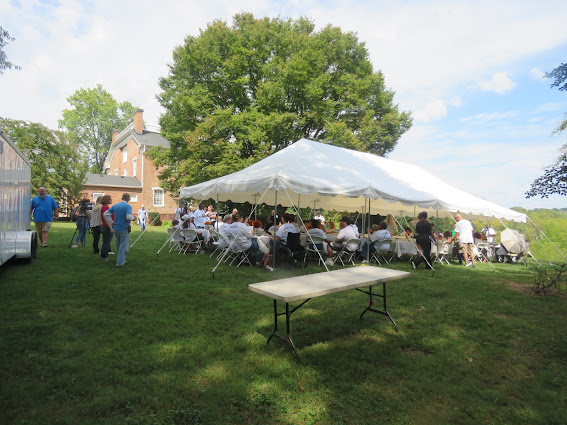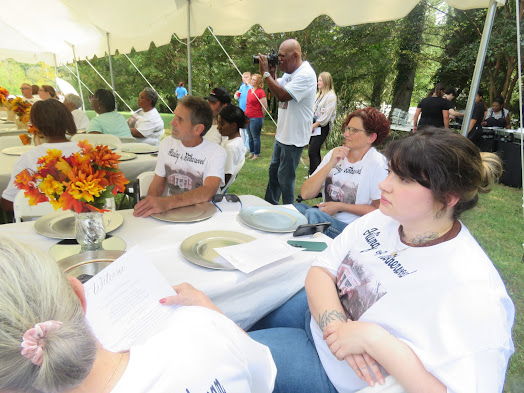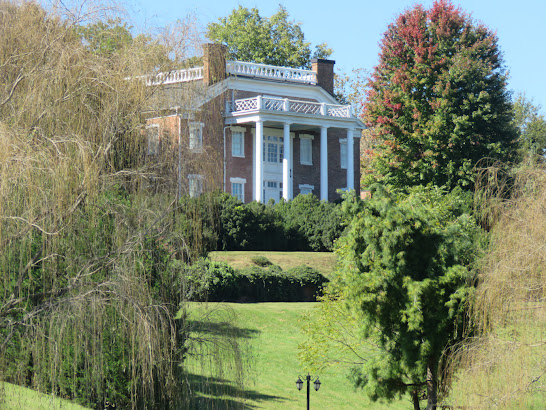This story courtesy the Kingsport Times-News, text by Anna Adams. Pictures by Anna Adams and Calvin Sneed.
KINGSPORT — Forgiveness, healing, history -these were just a few words attendees used todescribe the “Healing of Rotherwood” reunion of descendants of former slaves and slave owners who lived at the mansion and former plantation.
The reunion on Saturday was at the Rotherwood Mansion. It was not open to the public, and 125 people were on the list to attend. On the warm, sunny afternoon, people mingled, listened to music, dined together and learned about their shared history.
Dr. Lenita Thibault, owner of Rotherwood Mansion, said it was an honor to host the reunion.
“In my opinion, knowing and acknowledging our history and all its messiness and its contradictions, it’s good and it’s bad, is vital to achieving any type of reconciliation and healing,” she said.
On the behalf of the city, Mayor Paul Montgomery proclaimed Sept. 21, 2024, as “Reunion Day for Descendants of Slaves and Slave Owners.”
“It’s important that we all look at unity all the time and see how we can do this together, because we find sometimes that we’re more alike than we’re different,” Montgomery said while addressing the attendees.
Before food was served, many people spoke of the importance of the day and the impact it had.
“Healing of Rotherwood is a part of God’s plan for healing of Kingsport and healing of Tri-Cities, healing of this region and beyond,” the Rev. Doug Tweed said.
Gospel group 4Him performed two songs for the attendees as they watched and clapped to the music.
Calvin Sneed, a direct descendant of slaves who took the name Stafford before the Civil War, detailed the history of the land and mansion.
He said those listening should take everything with a grain of salt. He was told most of the information, or read about it in articles, as the history was not written down.
“There are lessons to be learned from history,” Sneed said, “no matter how you learn it.”
From the Archives of KingsportIn 1817, Frederick Ross inherited the land in Kingsport next to the Holston River. This was most likely when slaves were brought to it, and they did the farm work and worked in the iron mill, Sneed said.
Ross built Rotherwood Mansion, naming it after a mansion in “Ivanhoe” by Sir Walter Scott, Sneed said, and the slaves lived in what was called Rotherwood Heights, across the road.
“He [Ross] was kind to his slaves, and he freed many of them before the Civil War,” Sneed said.
Things changed around 1850, when Ross lost money and sold the property to his bookkeeper, Joshua Phipps. Sneed said through his research, Phipps is remembered as a cruel slave owner who beat the slaves and offered reward money to those who captured runaway slaves.
Slaves were beaten so badly they could not work the next day, Sneed said he read, and a room in the house had stocks to put slaves in.
The history of the slaves and slave owners is evident in the area. Sneed’s ancestors, the Staffords, divided the plantation land into lots.
“You’ll find at least three streets named after families who lived there: Watterson Street, Gray Avenue, Stafford Street,” Sneed said.
Many descendants stayed in East Tennessee.
“No matter what, we have to reconcile and acknowledge simply because it makes us better people,” Sneed said. “I don’t have any animosity about what I found out and what I told you today. God has put the knowledge in my heart, and God has put forgiveness in my heart. Something bad happened here, but something good happened here today.”
People who attended the reunion were impacted in their own ways.
Jane Marie Robinson, mistress of ceremony and descendant of Victoria Phipps, a slave under Joshua Phipps, said when she was younger, the only history she learned was what her parents told her. It sparked her curiosity.
“As far as I am concerned it [the reunion] is a closure of curiosity,” she said of the event.
“I am very well pleased,” Green said, “and I am thankful to the Lord that it is going as well as it is.”
Green was brought up knowing parts of her history. She said she never had any bitterness, but she did have curiosity and hurt.
“I had questions as to why,” she said.
Although the reunion could not answer those questions, she said it brought her hope for healing and love.
“[People] should view this as a hopeful event,” Green said. “Hopeful that one day we will all be one race, and one group of people, no division.”
Mark Fleenor, direct descendant of slave owner Joshua Phipps attended the reunion and brought portraits of Joshua’s daughter, husband and child. Joshua Phipps was Fleenor’s great-great-great-grandfather.
Fleenor said he was taught some of the history, but never expected he would meet with descendants of slaves on the same property.
“I feel wonderful; it’s opening my eyes to wider history and connections of families in East Tennessee that we’ve not talked about enough and need to,” Fleenor said.
At the reunion, Fleenor ran into Jill Rich. They looked surprised and then exchanged a hug. Rich said their kids grew up together, and she had not seen Fleenor in about 10 years.
Rich is a descendant of Ann Bachman, Joshua Phipp’s second wife, Fleenor said. Before the reunion, they did not know they were related.
Researching and learning his past helped Sneed understand who he is as a person.
“I love these people, because they are my new family,” Sneed said. “They are the family I never knew I had.”
Sneed said he hopes the reunion can be done again, and open it up to the public next time.
“I feel like I’m family with these guys here; I feel like we’re all a part of a family in Kingsport that most people never even knew about, and finding out about that family is a good thing,” Sneed said. “I’m gung-ho; I want to do it again.”








.jpg)

















%20Hodges.jpg)











